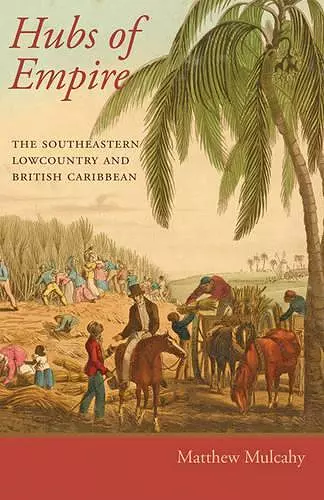Hubs of Empire
The Southeastern Lowcountry and British Caribbean
Format:Paperback
Publisher:Johns Hopkins University Press
Published:24th Oct '14
Currently unavailable, and unfortunately no date known when it will be back
This paperback is available in another edition too:
- Hardback£43.00(9781421414690)

This insightful book explores the interconnected histories of Caribbean colonies, particularly focusing on Hubs of Empire and its significance in Britain's Atlantic economy.
This volume serves as an excellent introduction to the intricate and captivating history of colonies that are frequently overlooked in traditional textbooks. In Hubs of Empire, Matthew Mulcahy presents a compelling argument for viewing Barbados, Jamaica, the British Leeward Islands, and the South Carolina and Georgia Lowcountry as interconnected regions. Although separated by vast oceans, these territories shared a common history and economic interests that contributed to the formation of the Greater Caribbean. Despite its limited presence in the historical narratives of many Americans, this area was a crucial hub of Britain's Atlantic economy.
The narrative begins in the sixteenth century, offering insights into Native American life and early incursions by pirates and privateers. Mulcahy delves into the establishment of settler colonies during the seventeenth and early eighteenth centuries, highlighting the diverse groups of European colonists who contributed to the region's development. He also addresses the political, economic, and military challenges faced before the onset of the Seven Years War. The plantation system, which reached its most severe form in the Greater Caribbean, was characterized by a significant number of enslaved Africans, often outnumbering Europeans, thus allowing for the preservation of African traditions and the emergence of unique creole cultures.
Hubs of Empire is not only a meticulously constructed account of the British Greater Caribbean but also a work that is both historically accurate and intellectually stimulating. Matthew Mulcahy's expertise and mastery of the historical context shine throughout the text, making it a valuable resource for anyone interested in this often-neglected aspect of history.
Overall this is a fine book: balanced, comprehensive, and well written... The use of texts like Hubs of Empire is critical to the recuperation of this historical experience shared alike by what became the United States and its Caribbean neighbors in the sixteenth and seventeenth centuries. -- Robert Goddard Southern Spaces Mulcahy's theoretical approach is sure to foster much debate in both the classroom and the wider academy... Recommended. Choice Mulcahy's theoretical approach is sure to foster much debate in both the classroom and the wider academy... Recommended. Choice [Mulcahy] writes with clear, thoughtful and engaging prose. This book would be an ideal choice for undergraduate courses on the early United States or on the Atlantic World. Journal of Historical Geography ... Hubs of Empire: The Southeastern Low country and British Caribbean is an ideal introduction to the main themes of the Greater Caribbean for undergraduate classrooms and for graduate students seeking a snappy and thought-provoking synthesis. Journal of Southern History Written with clarity and vigor and will be key to changing perceptions in the teaching of early American history. Journal of American History ... Mulcahy's survey provides a good argument for thinking about the way we delineate historical spaces and the way geography and environment shaped the social and economic worlds of the people who came to inhabit them... Reviews In American History
ISBN: 9781421414706
Dimensions: 216mm x 140mm x 16mm
Weight: 318g
256 pages